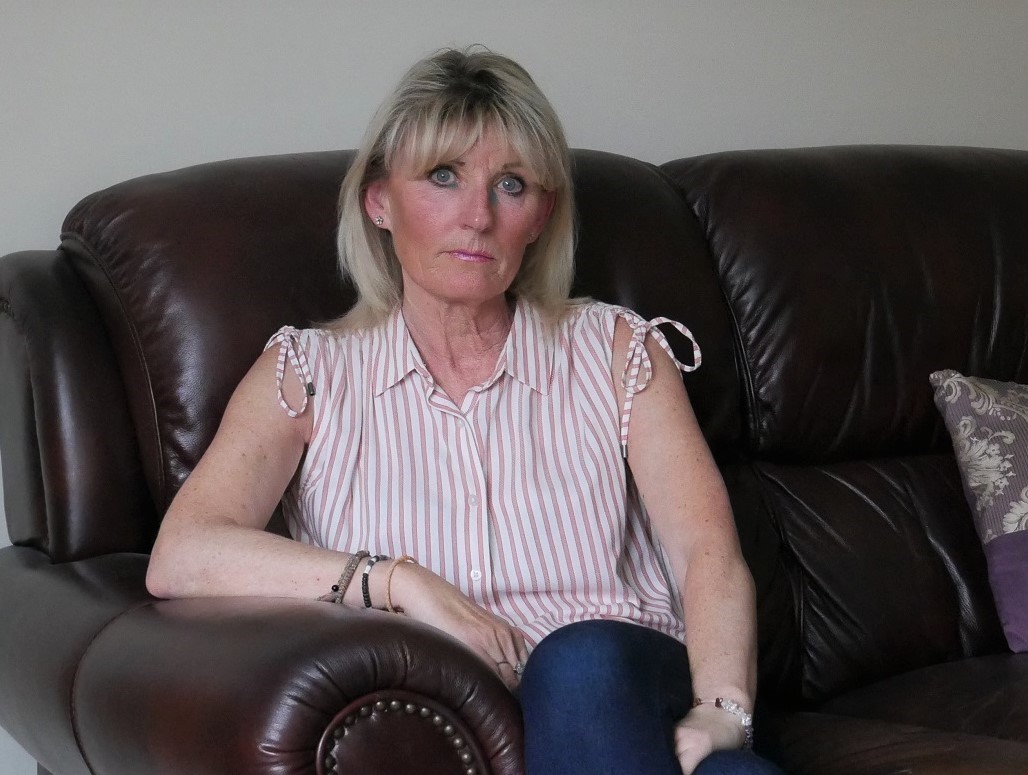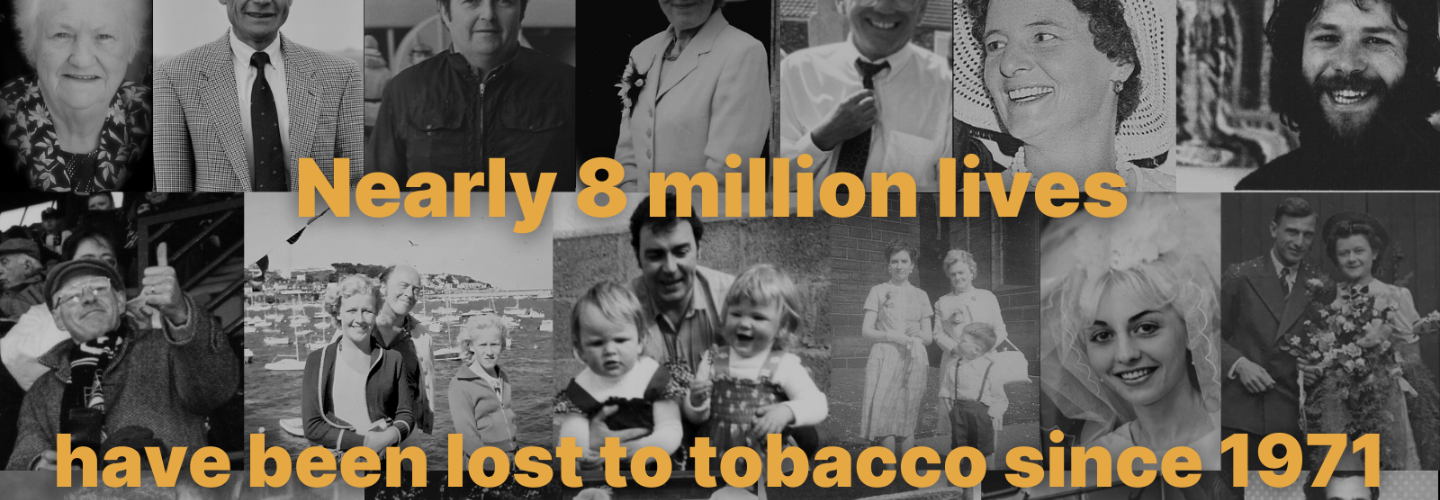8 million UK deaths from smoking
NEW figures to mark 50 years of action to reduce smoking shows tobacco has killed nearly 8 million people in the UK since 1971.
The new analysis to mark the 50th anniversary of Action on Smoking and Health also estimates that 2 million more people are expected to die in the next 20 years without radical changes to smoking rates.[1] Action on Smoking and Health charity was established by the Royal College of Physicians in 1971 following a landmark 1962 report recommending urgent government action to curb the harms from smoking.
The modelling is by Professor Sir Richard Peto, world renowned epidemiologist and statistician whose work with Richard Doll established the full impact of smoking on the health of the population. Their work showed that in the 1970s the UK had the worst death rate from smoking in the world, with half of male deaths in middle age and a quarter of those among women caused by smoking.
If the same proportion of adults smoked today as in 1971 there would be an additional 18 million smokers in the UK today, losing on average 10 years life expectancy because of their addiction.[2]
In the North East, which has historically has the worst rates of smoking, smoking has killed more than 113,000 people since the start of the Millennium. However the region has seen the biggest fall in smoking in England since 2005 when 29% of adults, or 581,000 people smoked down to around 15.3% in 2019.
Stewart, age 61
Ailsa Rutter OBE, Director of Fresh and Balance said: “We need to remember the hundreds of thousands of people in the North East who have died from smoking – they were loved mums, dads, brothers, sisters, grans and grandfathers with lives cut short too soon. Twenty years ago, I lost my own father Stewart at the age of 61 to an entirely preventable smoking related illness. Like so many millions he had got hooked onto smoking when he was still a child and never imagined how devastating this would ultimately be. Every day I remember him and we need to make sure the harm stops here and push for more action to stop this happening to other families across the region.

“We know here in the North East we have high levels of public support for important measures like making tobacco manufacturers pay a levy to Government for measures to help smokers quit and prevent young people from taking up smoking, and raising the age of sale to 21.”
Ronnie, age 76
Ex-smoker Sue Mountain, from South Tyneside, lost her dad Ronnie Johnson to smoking-related COPD.
Sue herself underwent laser treatment in 2012 after a biopsy revealed she had laryngeal cancer. The cancer returned in 2017 which required radiotherapy every day for four weeks.
Sue said: “I lost my dad to smoking, and after suffering cancer I consider myself one of the lucky ones to still be here. We have a real opportunity to end the harm caused by tobacco once and for all.

“I started smoking when I was a kid, before I realised how addictive it was and it was a time when it felt like most people smoked. I don’t want my grandchildren to go through what I went through; I want them to grow up in a world where smoking is a thing of the past.
“Smoking makes life a misery for many thousands of people who suffer from diseases before it kills them. It’s shocking that tobacco companies are making massive profits from an addiction that robs people of their lives and their health. I believe they need to pay for the damage they do.”
John, age 54

Alice Wiseman, Director of Public Health for Gateshead said: “Countless families here in the North East know only too well the misery and the grief caused by smoking. For many years smoking – and the diseases it causes – were simply accepted as part of life.
“My amazing dad John died in 2000 aged just 54 when he should have been enjoying his family life to the full. He left behind a wife and two sons and two daughters who loved him dearly. He only got to meet one of his seven grandchildren and missed out on all the stories, the cuddles, the fun and the love. I miss his wisdom, support and also the advice he would have given me, particularly over the challenges of recent months. He left a hole in my life that no one could ever replace.
“Millions of people have died from smoking in the last half century and the time is now to ensure this harm stops here. We need to encourage more people to quit, and most of all need more action from the Government to stop more people being killed by the tobacco industry. Cigarette companies are the most immoral industry on earth. It is the only product sold that, when used in the way it was intended, kills half of all people early simply to feed their profits.”
Heather – age 67
Alyson Jordan, 50, from Birtley, lost her mum, Heather, in 2016 aged just 67, after an eight-year battle with COPD. Alyson said: “”It’s five years this month since we lost Mum, and if she was still alive she would have been 72 years old and enjoying her retirement just how she had planned it to be. 67 is no age to die. It’s still young. She should have been watching her grandchildren grow up.
“When she became ill, she was coming up to her 60th birthday and should have been enjoying her retirement. After her diagnosis, it was awful. Anxiety and depression set in and she became housebound. She stopped doing everything, even down to making a cup of coffee.

“When I think about that time, I just can’t believe that she went from the woman she was to the woman she became. She wasn’t like my mum. She went from a healthy weight to around seven stone and she was skin and bones. It was heart-breaking to see. She ended up on oxygen 24 hours a day. She was such a proud woman, she didn’t want to use it.”
“My mum is just one of the millions of people who have died from smoking but every life lost is a tragedy to the people they leave behind.”
Action on Smoking and Health charity was established by the Royal College of Physicians in 1971 following their landmark 1962 report recommending urgent government action to curb the harms from smoking.[3] When no action was taken the College set up ASH with a mission to campaign for change. Five decades on, the calls to action, which once appeared radical, have largely been implemented thanks to the work of ASH working with the RCP and others to transform British society. In addition, the current Government has pledged to make smoking obsolete and England ‘smokefree’ by 2030. [4]
However, given current trends in smoking we are on course to miss the 2030 target by seven years, and more than twice that for the most deprived smokers.[5]
Deborah Arnott, Chief Executive of ASH since 2003 said: “Government knew about the terrible harms from smoking in the 1950s but it took the tireless efforts of campaigners to bring about change. Today, we have a Government with a vision to make smoking obsolete, but vision alone is not enough. Two years ago the Government committed to ‘bold action’ to ‘finish the job’, including the option of a ‘polluter pays’ levy on the tobacco industry, when will it deliver on this promise?”
Dr Andrew Goddard, President of the Royal College of Physicians said: “”When the RCP had the vision to set up ASH 50 years ago, my predecessors knew the scale of the challenge to reduce death and disease from smoking, against the all-pervasive influence of the tobacco industry and its cosy relationship with government at the time.
“ASH has proved itself over and over again as an effective organisation, not just for its own work, but its vital role in supporting and maintaining the wider tobacco alliances of like-minded bodies, coordinating campaigning efforts to make us all work better together.
“There is still much work to do, particularly in the field of health inequalities, and it is time for the government, the NHS and the new public health structures to intensify their efforts in this area to speed up the pace of change. Until we have a smokefree society, we will still need ASH, and I am proud to work alongside them to campaign until that day.”
ENDS
A timeline in action to tackle smoking since 1971
1971: Action on Smoking and Health established by the Royal College of Physicians following the refusal of the UK Government to act on the College’s demand for laws to reduce tobacco use. Following a campaign by ASH in its first year, London Transport increases the proportion of carriages in underground trains reserved for non-smokers from 50% to 75%, and bans smoking on single-decker buses.
1984: Following a fire at Oxford Circus tube station, possibly caused by a cigarette, London Regional Transport bans smoking on all Underground trains.
1986: A ban on tobacco advertising in cinemas and six new health warnings are introduced. The Protection of Children (Tobacco) Act is passed, which makes it illegal to sell any tobacco product to children aged under 16; previously the law applied only to smoking tobacco.
1987: Following the King’s Cross underground fire, in which 31 people died, London Underground immediately bans smoking throughout the network and bans tobacco advertising. British Rail also bans smoking on a section of commuter line which runs through a deep tunnel in Central London.
1991: The government announces a series of new, larger health warnings for tobacco packaging, in line with EC requirements. This is the first time that health warnings are legally required, as opposed to covered in the voluntary agreement
1992: The Children and Young Persons (Protection from Tobacco) Act tightens up legislation on the sale of cigarettes to children under 16 while the first nicotine patch is made available on prescription in the UK.
1993: Three tobacco companies lose their legal fight to reduce the size of the health warnings on cigarette packets.
2003: Tobacco advertising is banned on billboards and in the print media, and bans direct mail, internet advertising and new promotions.
2005: A ban on tobacco sponsorship of global sports such as Formula One motor racing. The first global health treaty – the Framework Convention on Tobacco Control – enters into force on 27 February 2005 and is ratified by 40 countries.
2006-07: Smokefree laws are implemented first in Scotland and then in England. Age of sale is also raised to 18 in 2007.
2012-15: Tobacco is no longer allowed to be on display in supermarkets and by 2015 small shops
2015: UK law on standardised packaging come into effect on the 20th May. Figures from the Office for National Statistics show the lowest ever recorded prevalence of smoking in the UK (15.8%).
2015: It is no longer legal to smoke in a car carrying anyone under the age of 18
2020: ASH and partners launch a campaign for a Smokefree 2030, with the publication of a Roadmap setting out what the Government needs to do to deliver on its ambition to make England smokefree by 2030. Evidence grows that smoking causes worse outcomes for Covid.
References
[1] Peto R et al. Mortality from smoking in developed countries 1950-2020. November 2021
[2] Analysis undertaken by ASH using ONS data on smoking rates for 16+ for GB population for 1971 and 2019 and UK 16+ population data for 2020
[3] Royal College of Physicians. Smoking and Health. 1962
[4] Department of Health and Social Care. Advancing our health: Prevention in the 2020s. July 2019
[5] Cancer Intelligence Team, Cancer Research UK. Smoking prevalence projections for England, Scotland, Wales, and Northern Ireland, based on data to 2018/19. Published February 2020.
